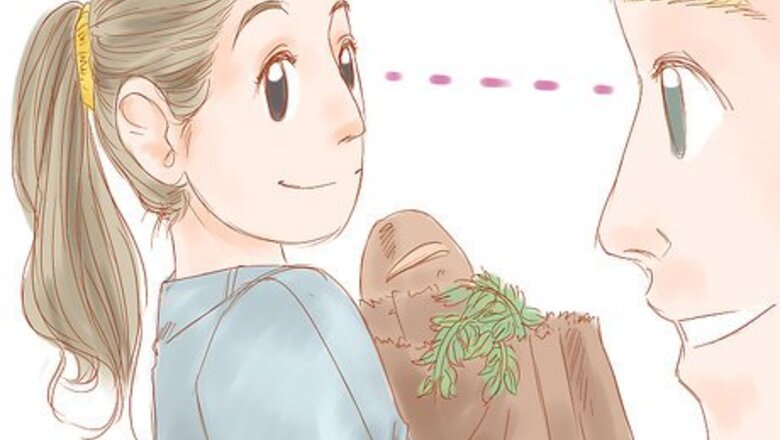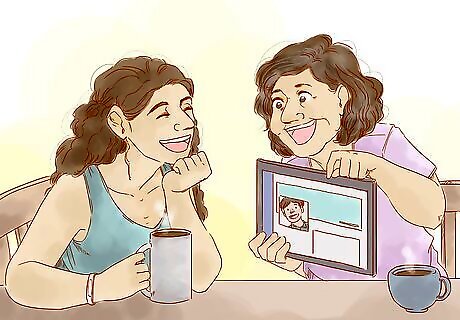
views
Make the Person Comfortable

Have approachable body language. If you want to make a person feel comfortable, the best thing to do is to have an "open stance" and to direct your body toward that person without being too forceful. Just make eye contact, don't cross your arms, and face your shoulders toward that person. This will make the person feel like you're giving him all of your attention and that you're not just lukewarm about talking to him. Maintain the right distance from the person. Put away your phone. There's nothing more annoying than talking to a person who is constantly checking their cell. Though you should look eager to talk to the person, don't look too eager. Don't lean in so close that you overwhelm the person or scare him away. Many people are turned off by a close-talker. Try to keep your hands out of your pockets, and avoid fidgeting if you can.

Give a friendly greeting. If you're seeing someone you already know, just say hello and greet her by her name: "Hi, Jen, it's good to see you." This is simple and direct and lets the person know you're excited to talk. If you don't know the person, introduce yourself first so you feel more confident and in control of the conversation. Just say, "Hi, I'm Marla, what's your name?" Repeat the person's name when she tells it to you, and she'll feel more special. Remember to smile and pay attention to the person when you greet her. Don't make it look like you're just killing time until your real friends come along.

Keep things light and positive. Conversations are just as much about an exchange of energy as an exchange of information. To make great conversation and great small talk, you should keep things light, fun, and positive. If you're upbeat, ready to smile at a moment's notice, and laugh over things that aren't that funny, then you'll make the other person want to keep talking to you -- even if you're only talking about your favorite brands of cereal. It's true: it may be hard to keep things light and fun when you've had a really bad day or bad week. But remember that if you're making small talk, then this person is not your closest friend, so you should avoid talking about anything too negative or the other person will be turned off.

Start with a small compliment. Just a simple, "I love your shoes -- where did you get them?" can get you into a fun conversation about shoe shopping. Even if the compliment doesn't lead anywhere, it will still make the person feel more appreciated before you start discussing other subjects. You can also use this move earlier, as a way to actually introduce yourself to someone. This can be a great way to chat with your crush.
Start Talking

Find common ground. Common ground doesn't mean that you and the other person are both die-hard horseback riders. It can just be as the fact that you've both had to deal with a lot of bad weather that week. Anything that the person can relate to and that establishes a connection, however tenuous, can be considered common ground. And just because you don't want to talk about the weather, remember that the "small stuff" can lead you to talk about the things that matter to you. Here are some ways to establish common ground: "Professor Hoffer is hilarious." "Ashley throws the most amazing parties." "Can you believe all of this rain?" "I just love coming to Arbor Cafe."

Reveal something about yourself. Once you've established some common ground, you can use it to elaborate and say something a bit more personal. You shouldn't say something so personal that it freaks the person out, like, "I've actually been in love with Professor Hoffer for the last five years," but you can ease in to talking about yourself just a bit more. Here are some things to say to follow up with the last statements: "He's the best teacher I ever had. He's basically the reason I'm an English major." "I actually met Ashley last year, when Ben took me to her Great Gatsby party." "The rain is just awful. I'm training for a marathon and had to do my long runs on the treadmill -- it's the worst." "Whenever I'm at this cafe, I just really feel like I'm in the zone. Maybe it's the intense drip-coffee -- but seriously, I feel like I can work for hours here."

Engage the other person. Now that you've established common ground and have revealed something about yourself, it's time to engage the other person and get her talking by asking her to reveal some information about herself. Don't ask anything too personal, like asking about the person's health, religion, or political views. Just keep it light and fun and ask open-ended questions about the person's interests, job, or surroundings. Here's how you can engage the other person: "How about you? Are you an English major, or are you here for Professor Hoffer's crazy stories?" "Did you go to that party, or is this your first time here? It was fun, but I drank too many mint juleps." "How about you? Has the rain kept you from doing anything fun this week?" "Do you come here to do some work, or are you just reading for fun?"

Follow up with a question or statement. The person's response will influence whether you follow up with a question, a statement, or a joke. Try to find a balance between questions and statements. Too many questions will make the person feel like he's being interrogated, and too many statements won't give the person room to talk. Here's how you can keep these conversations going: Other person: "I'm an English major too. I've always wanted to be an English major, but Hoffer's an added bonus for sure." You: "Oh, really? What are you thinking of doing with that? It's great to meet another person in this highly lucrative field." Other person: "I couldn't go to that party, but I did go to her Cinco de Mayo party last month. That party was crazy." You: "It really was! I knew you looked familiar. How do you know Ashley? Isn't she nuts?" Other person: "I don't mind the rain so much, but it made it hard for me to walk my dog! That was so annoying." You: "You have a dog too? I have a little poodle named Stella. Do you have a picture of your dog?" Other person: "I'm just here to read for fun. I can't believe I've gone this long without reading The Catcher in the Rye." You: "I love that book! Some people think it's overrated, but I completely disagree."

Notice your surroundings. Once you start really talking to the person and get your back-and-forth banter going, you can also look around for cues for what to talk about next. You can notice anything from what the person is wearing or holding, to a sign on the wall that may apply to both of you. Here are some things you can say: "Sweet 9ers jersey. That one's a classic. Have you been a fan for long?" "You ran the New York Marathon too? Which year? I don't know what I did with my t-shirt." "What do you think about this a cappella concert tonight? I've seen these flyers all over campus, but I don't know if I want to go." "Ah, the American Pageant. That book taught me everything I needed to know about American History. Is that class as easy as it used to be?"

Take the time to listen. Really listening to things that the person says can help you pinpoint new common ground and to steer the conversation in a more fun or productive direction. The person may make a small comment that's tangential to your question or topic, so keep your ears open and see if something the person says can trigger a new line of conversation. Here are some example of how two people can pick up on cues and steer a conversation in a new direction to connect on a deeper level: You: "I actually met Ashley on a Spring Break trip. We all went to Mexico with a bunch of friends." Other person: "I remember her telling me about the trip! I was actually helping her improve her Spanish for it, but I doubt she really used it much -- unless you count the phrase piña colada." You: "You speak Spanish? That's awesome. You could have helped me prepare for my study abroad trip to Madrid. My Spanish was okay by the end, but I could have used some help!" Other person: "I love Madrid. My grandmother actually still lives there, so I visit her almost every summer. She takes me to the Prado every Sunday." You: "Madrid is like my favorite city! The El Grecos in the Prado are to die for." Other person: "You like the El Grecos? I'm more of a Goya fan." You: "Oh, really? You know, there's actually a new movie about Goya coming out next week -- I think Ethan Hawke's in it! Want to go?" Other person: "Of course!"
Finish Strong

Open up (but not too much). By the end of the conversation, you could reveal something more about yourself, however small, whether it's your obsession with your cat, your passion for yoga, or just your thoughts on your favorite band's new album. Have the person walk away knowing something about you, which could make you connect on a deeper level and make the person think you weren't just shooting the breeze. You probably shouldn't reveal your thoughts on the meaning of life, lost love, or death in a round of small-talk. Just reveal something about yourself and wait to develop a deeper bond before you get too personal. Being genuine is a great strategy when you're talking to your crush. You might talk about something you're genuinely interested in, mention something you genuinely like about them, or ask a question that you're genuinely curious about.

If it's going well, mention hanging out again. If you've really enjoyed talking to the person, whether you're developing a crush or a friend crush, you can say that you really liked talking to this person about a certain subject and ask if the person wants to hang out again or get the person's number. Or you can just mention a place where you both will be. Here are some things you can say: "I'm really serious about seeing that new movie with you. Can I get your number so we can work out the details later?" "I've never met someone who loves The Bachelor as much as I do. My roommate and I have the best viewing parties every Monday night -- can I get your number so I can send you the info?" "Maybe I'll see you at Ashley's next party? I hear she won't let you in the door if you're not wearing a real toga, so it'll be something to see."

Say goodbye nicely. After you've made small talk but have to go, whether it's to get back to class or to talk to someone else at the party, you should make the person feel important, not like you were just paying your dues by talking to him. Here are some ways to end the conversation politely: "It's been great talking to you. I'll let you know how that paella recipe works out for me." "I'd love to talk more about Spain, but I haven't said hi to Nina yet, and it looks like she's about to leave." "Oh, there's my best friend, Kelley. Have you met her yet? Come on, I'll introduce you." "I wish I could keep talking to you, but AP Calculus is calling my name. I'm sure I'll see you soon, though."



















Comments
0 comment